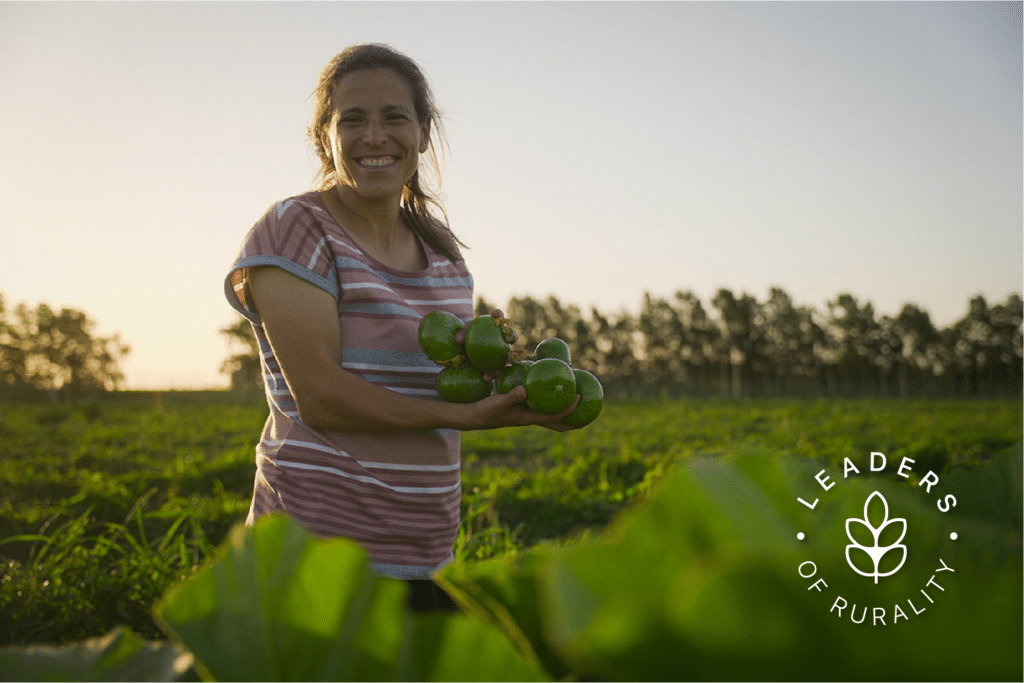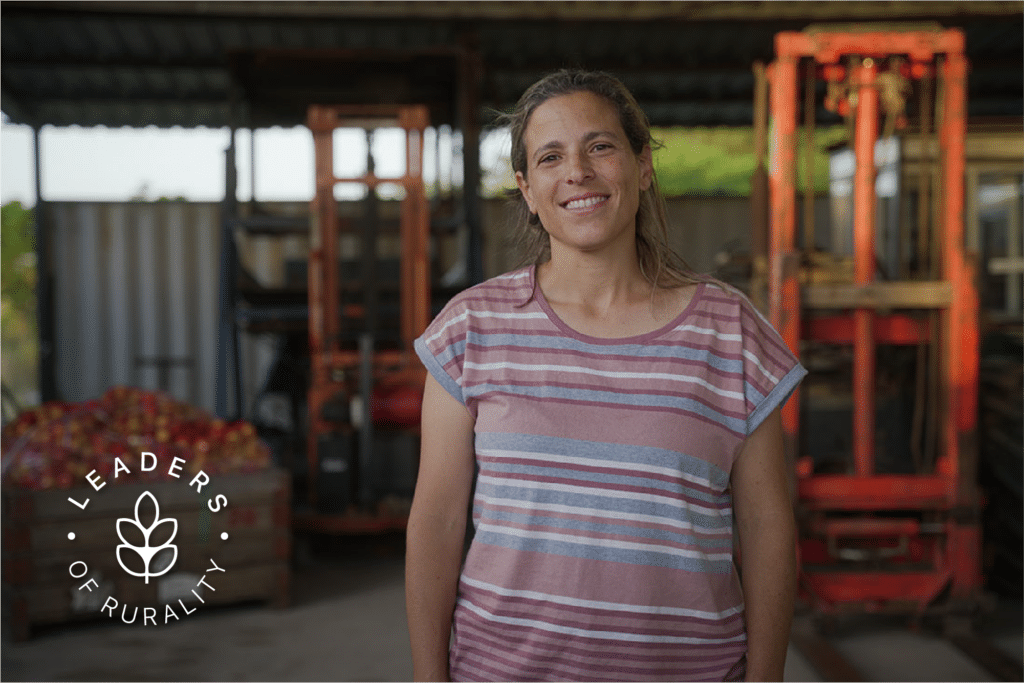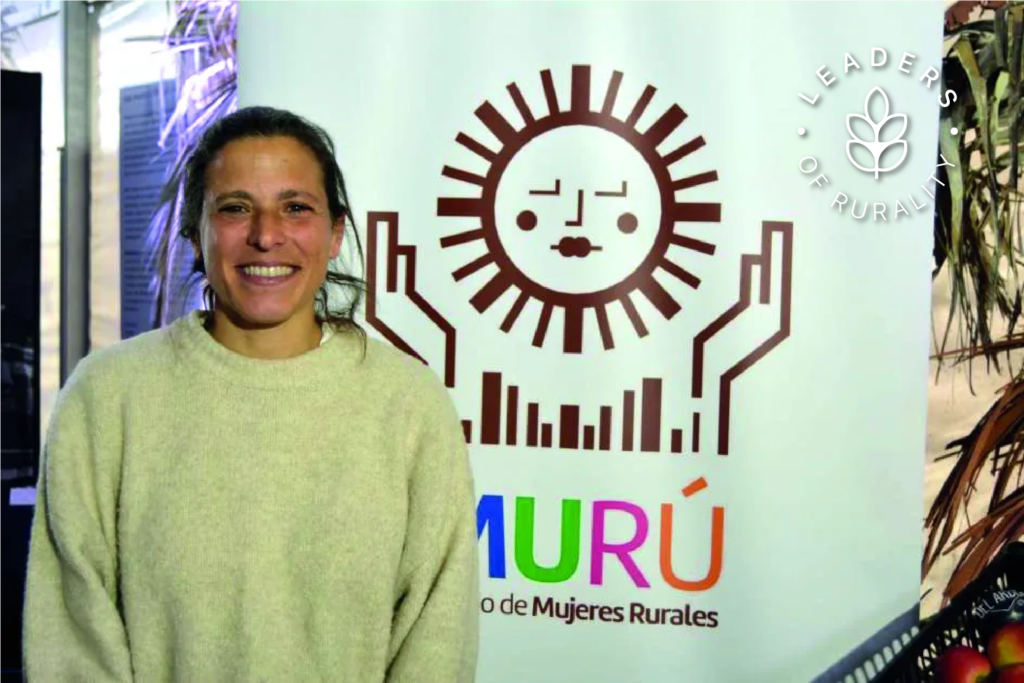
San Jose, 28 February 2025 (IICA) – Rosina Rodríguez was the first farmer awarded the right to use the Murú seal – a seal created by Uruguay’s Ministry of Livestock, Agriculture and Fisheries to identify and give recognition to products and services created by the country’s rural women. The Inter-American Institute for Cooperation on Agriculture (IICA) has also selected her as one of its Leaders of Rurality of the Americas.
Thanks to this IICA accolade, Rosina will receive the “Soul of Rurality” award, as part of an initiative by the specialized organization for agricultural development and rural well-being in the Americas to shine the spotlight on men and women who are leaving their mark and making a difference in the rural areas of the hemisphere, given their essential role as providers of food and nutritional security, who are also ensuring production and environmental sustainability.
A smiling Rosina meets with us in the cabin where she grew up as a child, in Libertad, a region in the department of San Jose. The 39-year-old woman loves talking about the countryside, about her business, technology and innovation, often punctuating her remarks with the prefix “re”, a colloquial term in her native Spanish that she uses to emphasize the things that most interest or concern her.
Although she returned to the countryside just over eight years ago, this young Uruguayan has had a “connection to agriculture ever since she was very small” thanks to her father, who passed on his love of the land and nature. “My husband and I decided to come here when Joaquín [the couple’s first child] was born”. They later had Clarita and Manuel. The idea was “to have more free time” to enjoy the family and “to choose a life that was more in keeping with our ideals”.
“Our story is somewhat the opposite of the traditional rural story”, says Rosina. When she was small, her father already had his farm, but they moved to Montevideo, due to her mother’s job. “Mother was the main breadwinner, and the financial situation in the countryside was not sufficient to support us”, she recalled.
In 2004, Rosina enrolled in the Faculty of Economic Sciences in Uruguay’s capital city. “I earned my undergraduate degree and soon I was working with China, with Brazil, as a trader… working in this and that, but always knowing that at some point I would return to the family farm”, because that “tiny seed of longing for the land” was always inside of her.
She stresses that “she was under no obligation to follow” her family’s agricultural legacy. “My parents gave me the freedom to discover my calling, to pursue my own desires”. But “when I felt I was ready, I told my father: ‘I am leaving my job and going (to San Jose) to sell your fruits’”.
“That is how I started”, Rodríguez says proudly, before filling in the details. Her father is retired, “but he still offers tremendous support”, explains Rosina, who, as she had promised, began by throwing her efforts into marketing, an area in which she felt comfortable, given her university training in international business.
A trip to Germany and a return to San Jose
As part of the process to familiarize herself with the profession and business of her father’s farm, Rosina travelled to an international fair in Berlin, Germany. “I found clients to whom I exported seventeen containers” of apples, making it clear to me that I had chosen the correct path. Soon “my husband [her unconditional partner who now travels to and from his job in Montevideo every day] and my children joined me”, she tells us happily.
Those first steps confirmed what many farmers throughout the world are experiencing in this age of rapid technological developments. In this world of innovation “the perspective of another generation cannot hurt” and usually allows one to add an export component or a production improvement to more traditional rural systems.
Bearing in mind this generational clash in thinking, Rodríguez notes that working in the countryside “is demanding nowadays” and not just because of the physical labor involved. “Today”, she emphasizes, “our products have to adapt to consumers’ wishes”, which is something that has often triggered friendly discussions with her father, who had insisted that “consumers have to purchase it, because it’s food. How can they reject it, because of a little blemish?”.
But “these are the rules of the game”, she reflects. “We began to change the way we produced to become more competitive. All the time we ask ourselves in what direction the world is going, particularly because fruit production is a slow business. Today we are creating orchards with varieties that I will have to ensure remain productive for twenty-five years”.

The privilege of farming the land
In describing life in the countryside, Rosina also stresses the fact that she and her family are tenant farmers on land leased by the Uruguayan state. She points out that they have a “responsibility” both to the National Colonization Institute, as well as “to planet Earth”. It is a “privilege to farm this land – land that belongs to us all. It is Uruguay’s land, not mine”.
Rodríguez notes that it is based on this premise that “we try to farm every inch” of the 126-hectare plot.
“We do everything and have several lines of business: fruit growing, livestock rearing and agriculture”. One of the key philosophies on Rosina’s farm is “rotation”. The other two are “rational use” and “responsibility”, both in crop selection and distribution as well as in water use for the cattle.
“Ever since I was very little, I used to hear my father say: ‘I am borrowing this land from my children’. And now that I have my own children, as a mother I embrace this philosophy. What land do I want to pass on to my children or to other children?”, she asks.
For now, a large part of the answer lies in “considering each step that we take, because I don’t want the earth to hold us accountable”, because we failed to care for it.
These steps include diversifying, for example, particularly after learning a hard lesson three seasons ago, when they decided to invest heavily in soybean production, oblivious to the fact that they would soon experience a drought.
After an “enormous effort to irrigate and an immense amount of energy” spent in planting the crop, “one particularly hot Sunday, I stood and surveyed the soybean crop. The thermometer reading was 50 degrees, the leaves had started to shrivel, the plants could not withstand the heat, and they aborted the pods just two weeks after planting. And it took me three years to pay for these seeds”.
What did Rosina learn from this? We learned to “consider very carefully what we invest in and how we do it”. Instead of aspiring to lofty goals, making the farm vulnerable to the effects of “an unpredictable climate that can cause you to lose everything”, Rodríguez has chosen to “do less and do it better”. This is “not less in the sense of leaving some of the land idle, but cultivating each small area conscientiously and using as diversified an approach as possible”.
“Apples are our mainstay, and we have devoted a great deal of resources to them, both financial, as well as work, energy and commercial effort”, explains the San Jose farmer. Thus, “we have to consider varieties that are consistent” and adaptable to climate changes. “If it is not raining, I need a hardier variety. If it is raining heavily, I will need a variety that will not require special treatment. It means going one step further, considering all the variables, although “we cannot and will never be able to control” the weather.
As far as the Murú seal is concerned, the mother of Joaquín, Clarita and Manuel tells us she feels a mix of “joy and responsibility” for the distinction. “I happen to be the first to be chosen, but there are many of us”, she assures us.
When someone is walking through a Uruguayan supermarket and notices the seal, the apples may not look different, but “that person knows that this fruit represents the efforts of a rural Uruguayan woman”.
It is an “invaluable” opportunity. “The fruits have the same value, but the fact that the public will know” that they were grown by the hands of women, “is priceless to us”.

A farm with a female overseer
Rosina reminds those who wish to follow in her footsteps that being a rural woman is still “not the same thing” as being a man. “It is not easy”. That is why she gives preference to female labor on her farm, to prove that it can be done. “I have female tractor drivers… as well as men”, Rosina tells us with amusement. I also “employ mostly women in the area of packaging and in organizing the work crews”.
Take Alexandra, who is just a few years younger than Rosina. She knows the operation better than anyone else, having obtained a special work permit for minors at just thirteen years of age, to join her mother as an apple picker. She is now the field supervisor, the general overseer. She operates the machinery “and has no issue in picking up any tool”, says Rodríguez.
Rosina also has some advice for younger women than her. “There is room for us” women. We only need “the courage to try”, because “if you have the desire, the will, love and a little luck, you can succeed”, even when sometimes “the traditional rural environment can discourage us”.
In any case, she says, “That is the challenge. Why not do things according to how we see the world and not the same as twenty years ago? It has worked for me, and there is no reason why other young women can’t give the countryside a try. We have to believe we have something to offer”.
Words of Rosina Rodríguez, recipient of the Murú seal and Leader of Rurality of the Americas.











